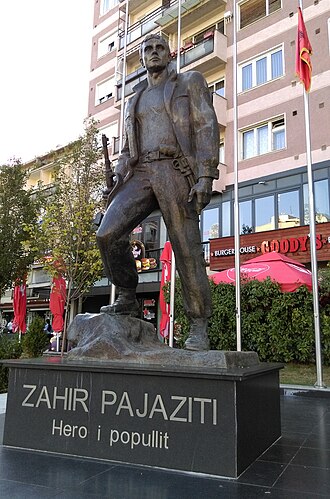Discover Your Roots
SIGN UPDiscover Your Roots
SIGN UPZahir is a male name of Arabic origin, meaning "radiant." In Islamic philosophy, Aẓ-Ẓāhir is one of the names of God, signifying "The Manifest, The Evident, The Outer," while in Islamic jurisprudence, Zahir denotes the exterior or apparent meaning of things. The name has also been featured in artistic works such as the short story "The Zahir" by Jorge Luis Borges and the novel "The Zahir" by Paulo Coelho. Notable individuals bearing the name include historical figures like Al-Zahir li-i'zaz Din Allah, Az-Zahir of Aleppo, and Zahir-ud-Din Babur, as well as contemporary figures like Zahir Al Ghafri, a renowned Omani poet, and Zaheer Abbas and Zaheer Khan, prominent cricketers from Pakistan and India, respectively. The name has also been associated with places like the Zahir Mosque in Alor Setar, Malaysia.

Zahir Pajaziti, born on November 1, 1962, and tragically passed away on January 31, 1997, is remembered as one of the founders and early commanders of the Kosovo Liberation Army, where he earned the title "First Gun of Freedom." Pajaziti was born in the village of Turuçicë in Podujevë and completed his education in Kosovo and Albania. Despite facing numerous challenges, he joined the Kosovo Liberation Army in 1994 and played a pivotal role in organizing military training for Albanians from Kosovo. Pajaziti's life was marked by his relentless dedication to the cause of Kosovo's independence, leading multiple attacks against Serbian police and collaborators. Unfortunately, his life was tragically cut short when he, along with two companions, was ambushed and killed by Serbian police forces in 1997. Following his death, Pajaziti became a symbol of resistance for Kosovo Albanians, inspiring numerous young men and women to join the KLA. His legacy lives on through commemorations, including bronze statues, streets, squares, schools, and institutions named in his honor across Kosovo. Zahir Pajaziti's life and actions continue to inspire studies, songs, and poems, ensuring that his impact is never forgotten.




All images displayed on this page are sourced from Wikipedia or Wikimedia Commons.We use these images under their respective Creative Commons or public domain licenses. Wherever applicable, author attributions and license information are provided. If you believe an image is used incorrectly or outside its license terms, please contact us so that we can review and correct the issue.